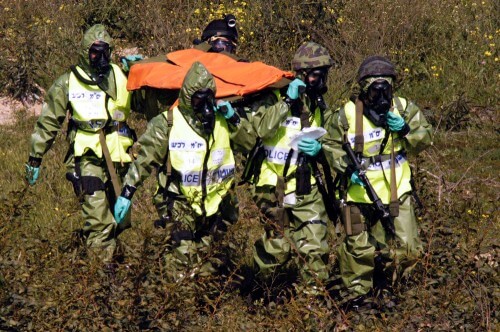2013 Nobel Peace Prize Winner Organization for the Prohibition of Chemical Weapons (OPCW)
...
It was a long time ago, though the time is passing,
I have not been wearing my office clothes since.
I was left with only a medal and tuberculosis…
You know what a gas attack is.
...
Another mention of a nurse, all of a sudden… all of a sudden
Horror came, we knew its smell.
Mom yelled - why did you hide?
Why is it, my children, you wore a mask ?!
And burst forward into the vortex,
The gas masks were compared to each other.
To a small one, I hit a skull
And three big ones I stabbed in the chest.
Every soldier seems to have never sung.
Every space as if astonished to die.
On the eve of death, on the bombs of thunder,
His brother man murdered in fear and innocence.
Another mention of a nurse - that should not be forgotten.
They were like me, they were good,
It was only forbidden to fight them to send,
They were only allowed to be given guns.
...
And now - here the war is gone.
The lamp is yellowish and I and you.
Seventeen years have passed since then,
There I was killed, slowly, slowly, slowly.
And everything is forgotten and here one dies quietly,
And death here is humble and polite,
Only I know - my lungs spit
More the hate, murder and gas.
Natan Alterman: Don't give them guns, describes a gas attack in the First World War

The Norwegian Nobel Committee decided to award the Nobel Peace Prize to the Organization for the Prohibition of Chemical Weapons (OPCW) for its vigorous efforts to eliminate chemical weapons.
During the First World War there was considerable use of chemical weapons. The Geneva Convention of 1925 prohibited the use, but not the production or stockpiling, of chemical weapons. During the Second World War, a chemical weapon was used for mass killing by Hitler. After this period, chemical weapons were used on several occasions, both by states and by terrorists. In 1992, the requirements for the prohibition of the production and storage of chemical weapons were also added to the convention. These requirements entered into force in 1997. Since then, the organization has striven, with the help of surveillance, destruction and other means, to implement the decisions of the convention. To date, 189 countries have signed the treaty.
The articles of the art and the activity of the organization led to the definition of the use of chemical weapons as a prohibition (taboo) within the framework of international law. The long-standing events in Syria, in which chemical weapons were used further, emphasized the need for increased efforts to destroy this weapon. A number of countries are still not members of this organization and a number of countries did not meet the deadline for the destruction of chemical weapons, which was April 2012, including the USA and Russia.
Disarmament is well in line with Alfred Nobel's world view (even though he was the inventor of dynamite) - the Norwegian Nobel Prize Committee, by awarding several Nobel Prizes, emphasized the need for the elimination of nuclear weapons. By awarding the Nobel Peace Prize to this organization, the prize committee wishes to contribute to the eradication of chemical weapons in our world.
Chemical Weapons Convention - Wikipedia
Organization for the Prohibition of Chemical Weapons - Wikipedia
